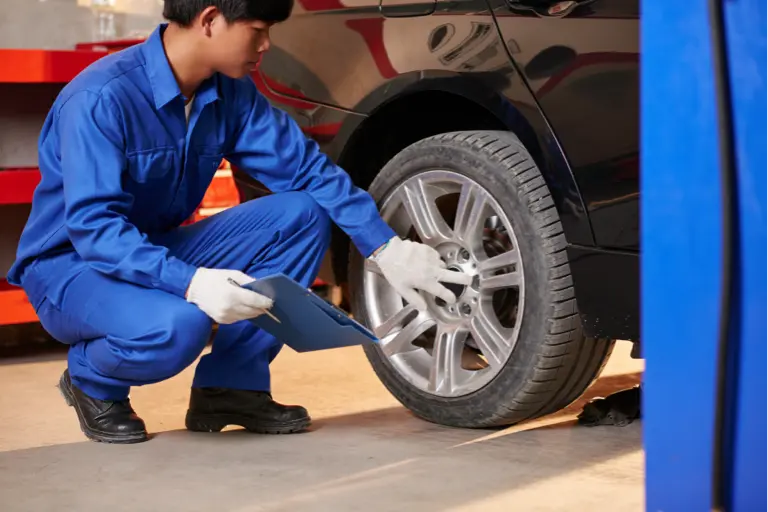Ensuring your fleet compliance is crucial for any business. By law, businesses must make sure their vehicles are safe, roadworthy, and well-maintained for their intended use. This requires a robust and comprehensive process to monitor every aspect of your fleet operations effectively.
However, maintaining a compliant fleet is more complex than many fleet managers think.
Fleet compliance involves demonstrating that all reasonable and essential measures have been implemented to provide a safe working environment. This includes equipping employees with the proper tools and resources to facilitate compliance.
Compliance is not just about adhering to regulations; it’s also about effective fleet management, which can lead to reduced operating costs and a significant competitive advantage. Below, we explore key strategies for maintaining fleet compliance.
1. Vehicle Checks & Maintenance
Vehicles used for business purposes must be inspected and maintained regularly to remain roadworthy. Legal requirements mandate evidence of routine internal and external vehicle inspections, focusing on safety-critical parts.
Drivers are required to conduct daily walkaround checks before operating vehicles, identifying and reporting any issues that could compromise safety. Any flaws rendering a vehicle unroadworthy must be addressed promptly to ensure compliance and safety.
A well-managed maintenance schedule is integral to fleet management. It minimises vehicle downtime, reduces repair expenses, and ensures fleet compliance with legal standards.
2. Documentation
Proper documentation is a cornerstone of fleet compliance. Businesses must ensure that all vehicles, including those owned by employees but used for business purposes, are adequately insured, taxed, and MOT tested.
Driver documentation, including licences, training certifications, and medical certificates, must be up-to-date, organised, and easily accessible. Failure to maintain accurate documentation can expose businesses to liability, prosecution, and invalidated insurance.
Fleet management platforms can simplify the process of tracking and updating these records, ensuring seamless compliance.
3. Duty of Care
Employers are responsible for the health and safety of their employees while they’re on the road. This responsibility extends to ensuring that drivers are adequately insured, trained, and in good health before operating any vehicle on behalf of the business.
Driver training should include safe driving practices and customer-facing conduct. Fleet managers should foster an open culture where drivers feel comfortable disclosing health issues without fear of retribution.
Adopting a duty-of-care approach improves fleet management by addressing potential risks proactively.
4. Driver Safety & Evaluation
Driver safety is a critical component of fleet compliance. Over a quarter of all road traffic collisions involve people driving for work purposes. Businesses must implement robust driver safety policies, including adherence to regulations on drivers' hours.
For example, UK regulations mandate:
- Keeping drivers’ hours records for at least one year.
- Ensuring drivers are trained and understand the rules.
- Organising drivers’ schedules to comply with working hours.
Drivers should take a 15-minute break every two hours to prevent exhaustion, a common cause of accidents.
Telematics systems play a vital role in fleet management by tracking driver behaviour, such as speeding, harsh braking, and idling. These insights enable managers to implement training programmes to improve safety, efficiency, and compliance.
5. Planning
Fleet compliance is an ongoing process requiring consistent policies and proactive planning. With regulations constantly evolving, businesses must adapt to stay compliant.
A comprehensive planning system allows fleet managers to monitor, react, and schedule key activities such as vehicle maintenance and driver training. Notifications and alerts ensure that deadlines and compliance requirements are met without delays.
Proactive planning is an essential aspect of modern fleet management, ensuring both efficiency and compliance.
How Prolius Fleet Supports Fleet Compliance
Maintaining fleet compliance can be challenging due to the complexities involved. Prolius Fleet offers a comprehensive fleet management platform designed to simplify compliance processes.
With Prolius Fleet, you can:
- Manage vehicle maintenance schedules.
- Track driver documentation and certifications.
- Monitor driver behaviour using telematics.
- Automate compliance alerts and reminders.
By centralising all fleet data, Prolius Fleet ensures that compliance standards are met efficiently, reducing risks and operational costs.
Real-World Results
According to a study by Fleet News, businesses with robust fleet compliance measures report a 20% reduction in operational risks.
Another report by Geotab highlights how telematics-enabled fleet management reduces accidents by up to 50%.
Conclusion
Fleet compliance is a critical aspect of effective fleet management. By focusing on vehicle maintenance, documentation, driver safety, and proactive planning, businesses can minimise risks, reduce costs, and enhance productivity.
Investing in a fleet management platform like Prolius Fleet provides the tools necessary for seamless compliance, ensuring that your fleet operates safely, efficiently, and within legal boundaries.
Take the first step towards comprehensive fleet compliance. Contact Prolius Fleet today to book your free demo and discover how we can support your business.
